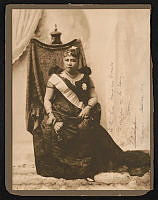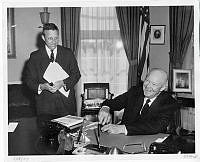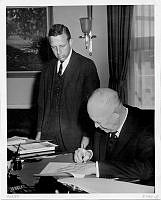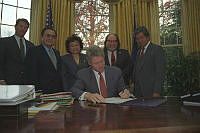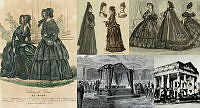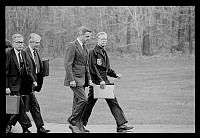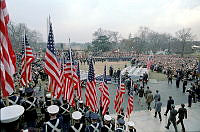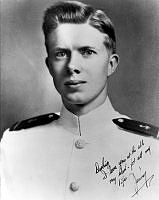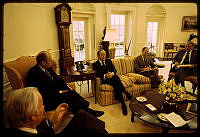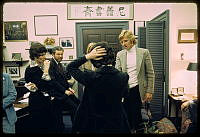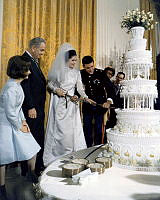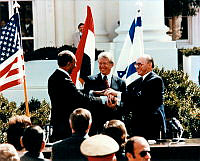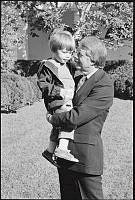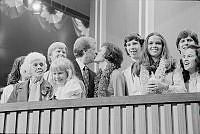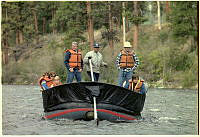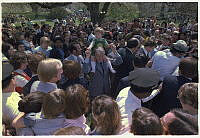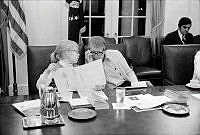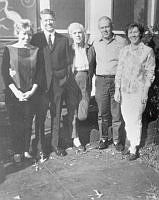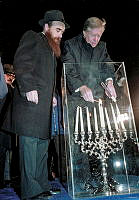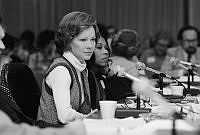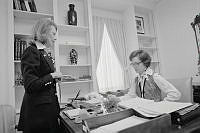William Henry Harrison

"Give him a barrel of hard cider and settle a pension of two thousand a year on him, and my word for it,” a Democratic newspaper foolishly gibed about William Henry Harrison “he will sit ...by the side of a ‘sea coal’ fire, and study moral philosophy.” The Whigs, seizing on this political misstep, in 1840 presented their candidate Harrison as a simple frontiersman, living in a log cabin and drinking cider, in sharp contrast to an aristocratic champagne sipping Van Buren.
Harrison was in fact a scion of the Virginia planter aristocracy. He was born on February 9, 1773 at Berkeley Plantation to one of Virginia's wealthiest slave owning families. He studied classics and history at Hampden-Sydney College, then began the study of medicine. Then in 1791, Harrison obtained a commission as ensign in the First Infantry of the Regular Army, and headed to the Northwest, where he spent much of his life. In 1795, Harrison married Anna Tuthill Symmes. They would go on to have ten children together.
As Native American peoples continued to resist displacement, Harrison served as aide-de-camp to General “Mad Anthony” Wayne at the Battle of Fallen Timbers, which opened most of the Ohio area to settlement. After resigning from the army in 1798, he became secretary of the Northwest Territory, was its first delegate to Congress, and helped obtain legislation dividing the Territory into the Northwest and Indiana Territories. In 1801 he became governor of the Indiana Territory, serving 12 years.
Harrison’s primary task as governor was to secure more land for white settlers. He negotiated treaties for millions of acres in exchange for small amounts of money. When Native Americans refused to accept these agreements, or attacked encroaching settlements, Harrison responded with military force.
The threat against settlers became serious in 1809. Eager to repel invading settlers, an eloquent and energetic Shawnee chief, Tecumseh, with his religious brother, the Prophet, began to strengthen an Native American confederation to prevent further encroachment. In 1811 Harrison received permission to attack the confederacy.
While Tecumseh was away seeking more allies, Harrison led about a thousand men toward “Prophetstown.” Both sides agreed to a ceasefire until Tecumseh's return. The next morning, November 7, 1811, the Native American warriors attacked his camp on Tippecanoe River. After heavy fighting, Harrison repulsed them, but suffered 190 dead and wounded in the Battle of Tippecanoe. After driving the warriors from the field, Harrison and his men then burned “Prophetstown.” Violence continued to escalate into the spring of 1812 as Tecumseh and his remaining Native allies carried out raids against white settlements.
During the War of 1812, Harrison won more military laurels when he was given the command of the army in the Northwest with the rank of brigadier general. At the Battle of the Thames, north of Lake Erie, on October 5, 1813, he defeated the combined British and Native American forces. Tecumseh was killed in the battle, scattering his allies and destroying the delicate Native American alliance he had forged. The Native Americans scattered, never again to offer serious resistance in what was then called the Northwest.
Throughout his lifetime, Harrison offered contradictory views on slavery. As a slave owner, he opposed the idea of Congress restricting slavery in new territories. As his political career took off, he carefully avoided condemning slavery and instead professed the belief that the states themselves should decide its fate. He was nominated by the Whig Party in 1840 and won the election by less than 150,000 votes; however he captured the Electoral College in a landslide, 234 to 60, with strong support from the western and southern states.
When he arrived in Washington in February 1841, Harrison let Massachusetts Senator Daniel Webster edit his Inaugural Address, ornate with classical allusions. According to one recollection, Webster obtained some deletions, boasting in a jolly fashion that he had killed “seventeen Roman proconsuls as dead as smelts, every one of them.”
Webster had reason to be pleased, for while Harrison was nationalistic in his outlook, he emphasized in his Inaugural Address that he would be obedient to the will of the people as expressed through Congress. But before he had been in office a month, he became severely ill. On April 4, 1841, he died at the White House—the first president to die in office—and with him died the Whig program.







